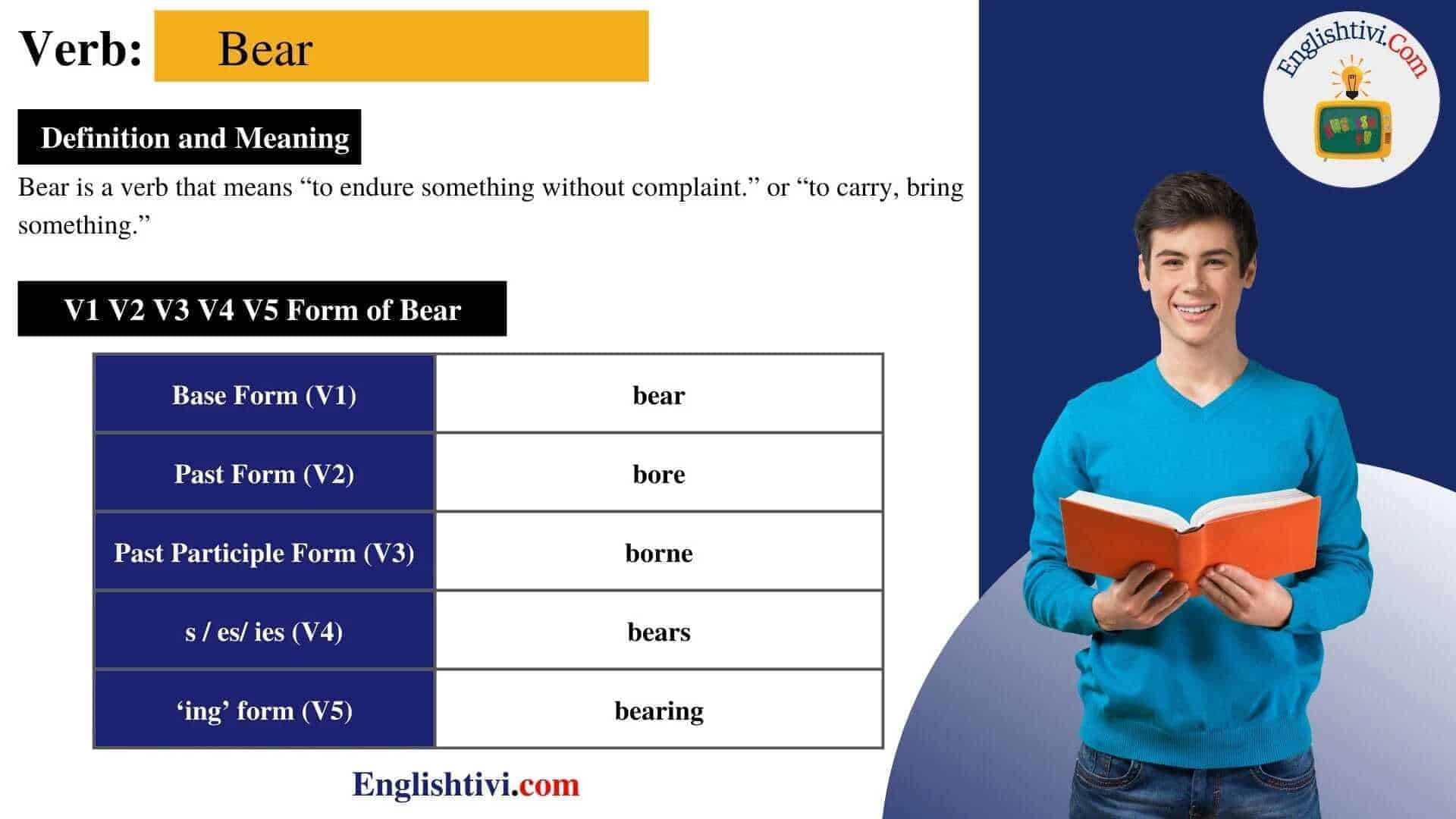
Bear V1 V2 V3 V4 V5 Base Form, Past Simple, Past Participle Form of Bear Englishtivi
The English verb 'bear' is pronounced as [ber]. Related to: irregular verbs. 3 forms of verb bear: Infinitive (bear), Past Simple - (bore), Past Participle - (borne).. Here are the past tense forms of the verb bear. 👉 Forms of verb bear in future and past simple and past participle. What is the past tense of bear.
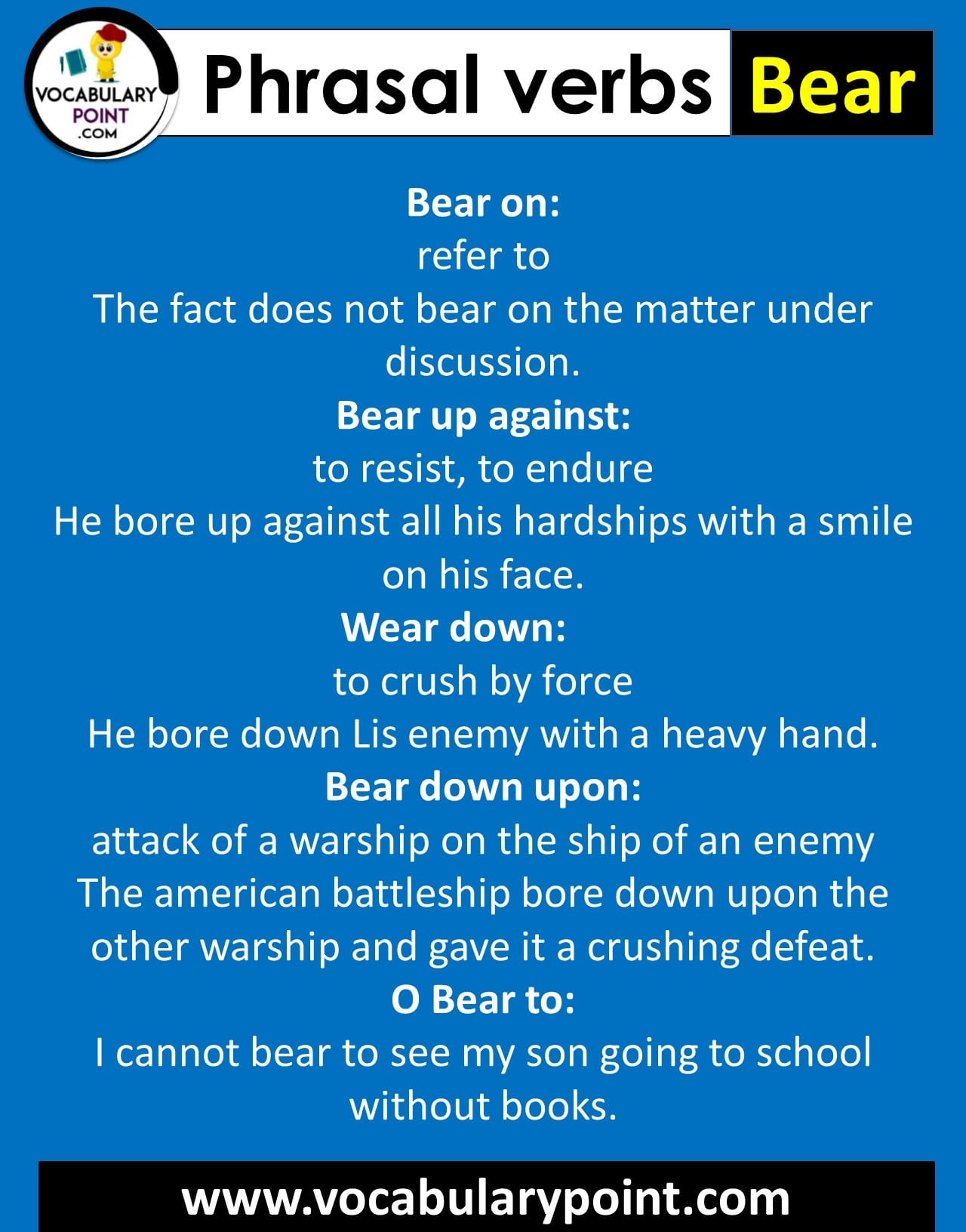
Phrasal verbs with Bear (on, upon, in, out, up, with) Vocabulary Point
Want to learn about the irregular verb 'Bear'? We've got all you need: clear definitions, conjugations, and usage examples for effective learning.
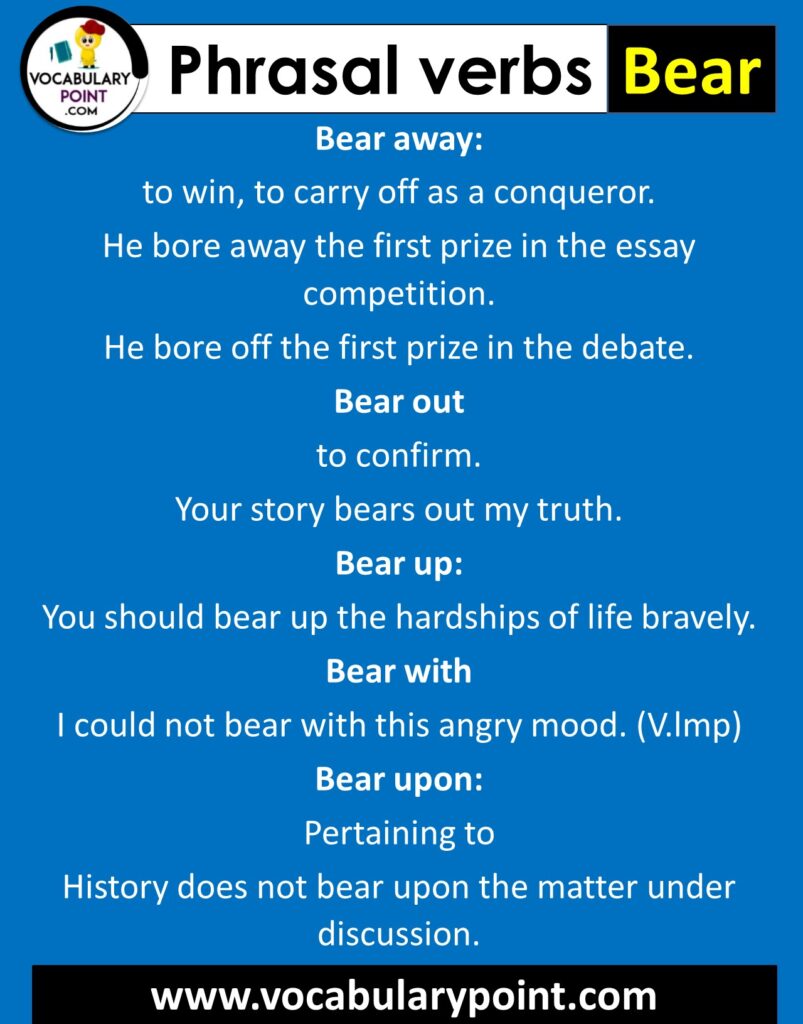
Phrasal verbs with Bear (on, upon, in, out, up, with) Vocabulary Point
BEAR meaning: 1. to accept someone or something unpleasant: 2. to be similar to someone or something: 3. to…. Learn more.

Phrasal verbs with bear Phrasal verbs with meaning, Sentences, Verb
BEAR definition: 1. to accept, tolerate, or endure something, especially something unpleasant: 2. to be responsible…. Learn more.
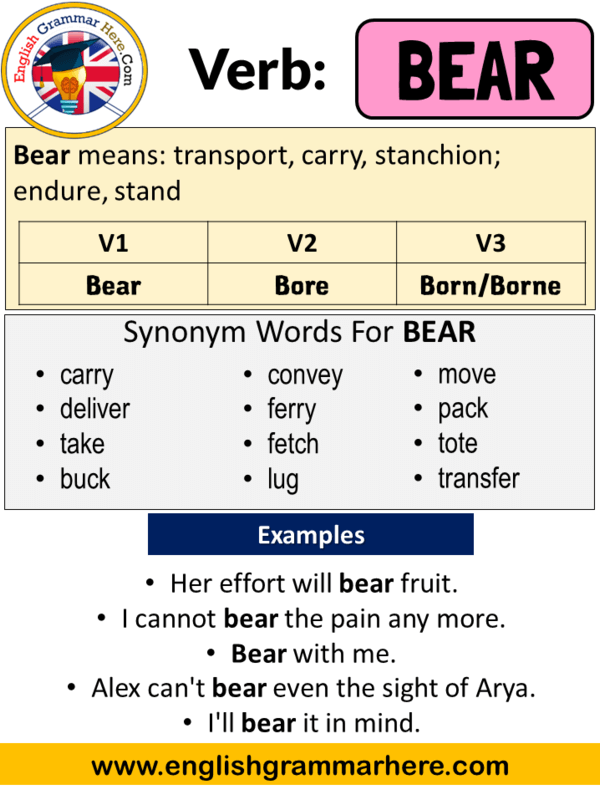
Bear Past Simple, Simple Past Tense of Bear Past Participle, V1 V2 V3 Form Of Bear English
2. He was born in New York.. The irregular verbs in the table below have the same pattern as bear. They are: - Verbs with '-ear', '-ore', '-orn' in the three forms. - Verbs like 'tear, tore, torn'. Verb Simple past Past Participle; bear: bore: born/borne: shear: sheared/shore: sheared/shorn: swear: swore: sworn:

GRAMMAR Active or Passive (to bear) ENGLISH Your Way!
Bear Verb 1 2 3, Past and Past Participle Form Tense of Bear V1 V2 V3. bear. Meanings; Carry the weight of; support.(transitive verb) Endure (an ordeal or difficulty)(transitive verb) (of a person) carry (someone or something)(transitive verb) Verb(V1) Past Tense(V2) Past Participle(V3) bear: bore: born: Verb - es(Ves)

Past Tense Of Bear, Past Participle Form of Bear, Bear Bore Borne V1 V2 V3 … English
BEAR meaning: 1. to accept, tolerate, or endure something, especially something unpleasant: 2. to be responsible…. Learn more.

Conjugation Bear 🔸 Verb in all tenses and forms Conjugate in past, present and future
Bear definition: to hold up; support. See examples of BEAR used in a sentence.
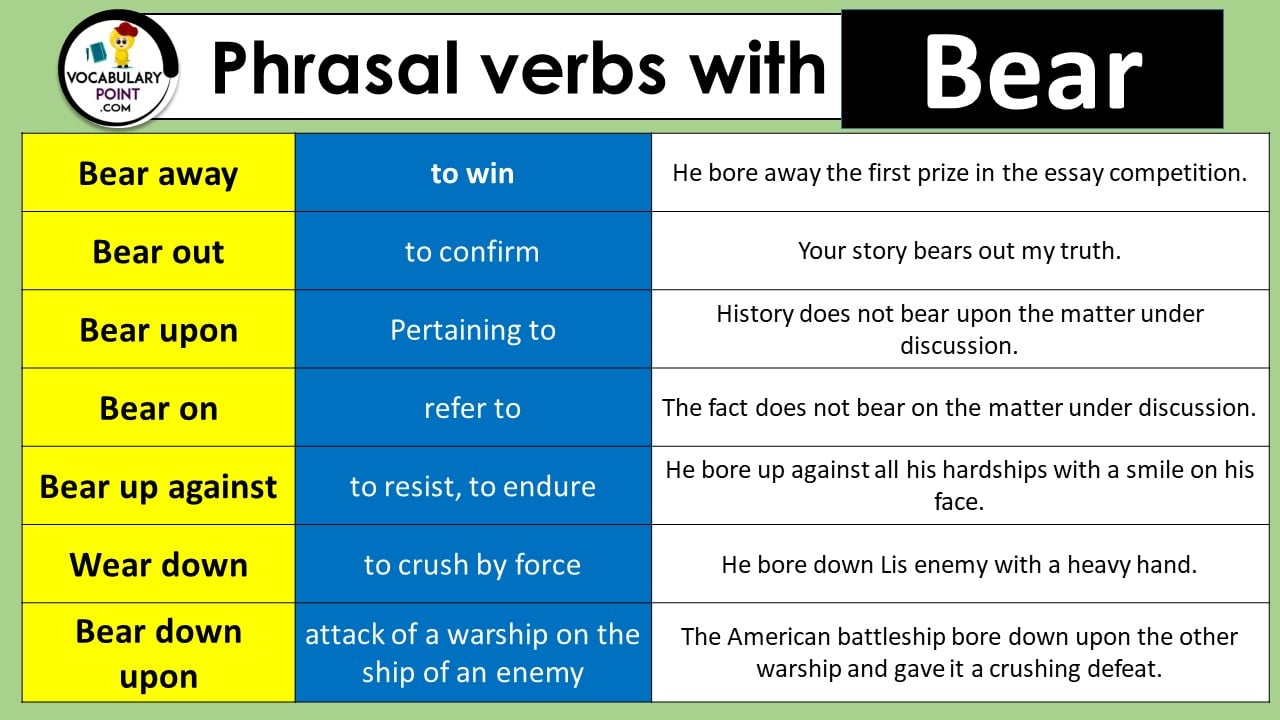
Phrasal verbs with Bear (on, upon, in, out, up, with) Vocabulary Point
25 meanings: 1. to support or hold up; sustain 2. to bring or convey 3. to take, accept, or assume the responsibility of 4. to.. Click for more definitions.

Past Tense of Bear, Past Participle of Bear, V1 V2 V3 V4 V5 Form of Bear Bear means; Carry the
Synonym for Bear; transport, carry, bear, wear, bear away, carry away, bear, endure, stand, tolerate, accept, digest. When learning English you need to know the meaning of certain words first, and then sort the words appropriately according to grammatical rules. Verbs in a regular structure can be transformed with a simple rule, whereas in.

Bear Past Tense Verb Forms, Conjugate BEAR
Bore is the past tense of the word bear. Borne is the past participle of the word bear. bear past form, verb forms, v1v2v3, Infinitive
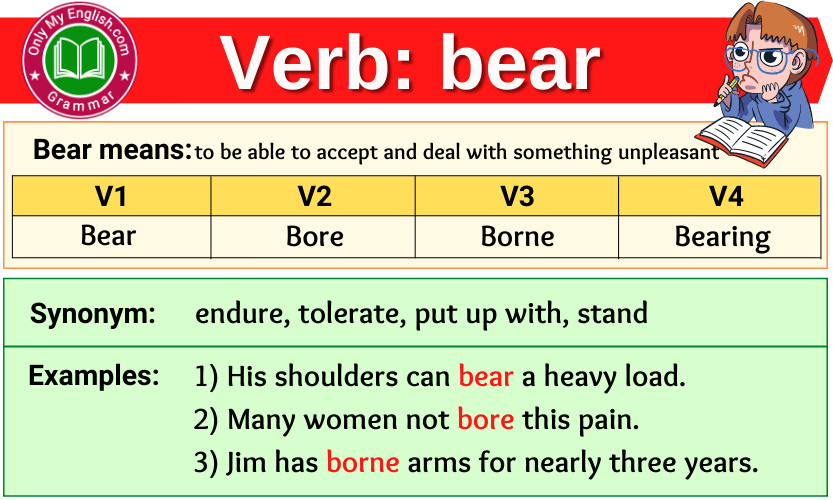
Bear Verb Forms Past Tense, Past Participle & V1V2V3 »
bear: [noun] any of a family (Ursidae of the order Carnivora) of large heavy mammals of America and Eurasia that have long shaggy hair, rudimentary tails, and plantigrade feet and feed largely on fruit, plant matter, and insects as well as on flesh.
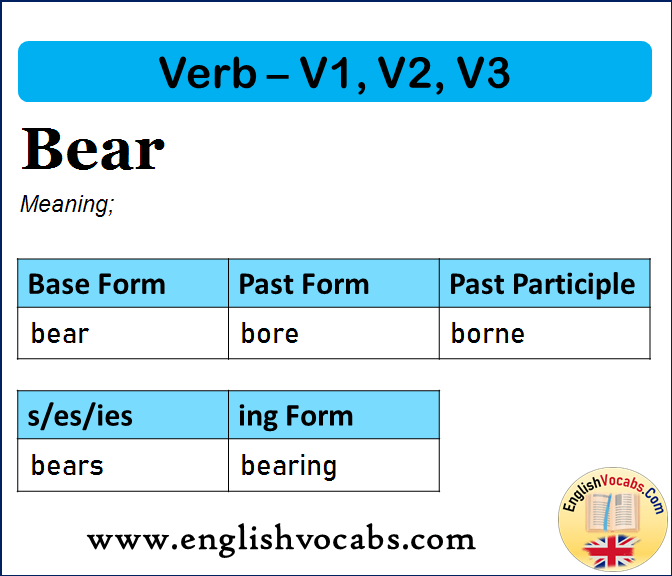
Bear Past Simple Archives English Vocabs
The earliest known use of the verb bear is in the 1830s. OED's earliest evidence for bear is from 1837, in the writing of W. Maginn. It is also recorded as a noun from the Old English period (pre-1150). bear is formed within English, by conversion. Etymons: bear n.1.

Phrasal verb ( bear away, bear on/upon, bear out, bear with) YouTube
Synonyms hate hate dislike can't stand despise can't bear loathe detest These words all mean to have a strong feeling of dislike for somebody/ something. hate to have a strong feeling of dislike for somebody/ something. Although hate is generally a very strong verb, it is also commonly used in spoken or informal English to talk about people or things that you dislike in a less important.

Verb forms of bear V1,V2,V3,V4,V5 BEAR shorts verbforms Arvindclassesenglish
The verb "bear" is an irregular verb. (This means that "bear" does not form its simple past tense or its past participle by adding "-ed" or "-d" to the base form.) The Five Forms of "To Bear" Form bear Alternative Name; Base Form: bear: Infinitive Form: The -S Form: bears: Third Person Singular Form: Past Form: bore:

Perbedaan kata "Bear (Noun)" & "Bear (Verb)" beserta ContohContoh Kalimatnya Nouns, Bear verb
BEAR definition: 1. to accept someone or something unpleasant: 2. to be similar to someone or something: 3. to…. Learn more.